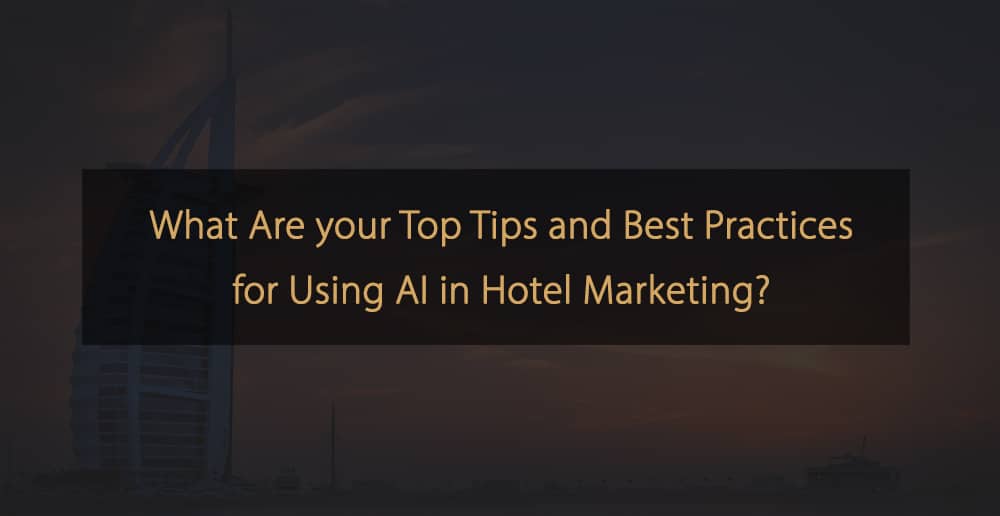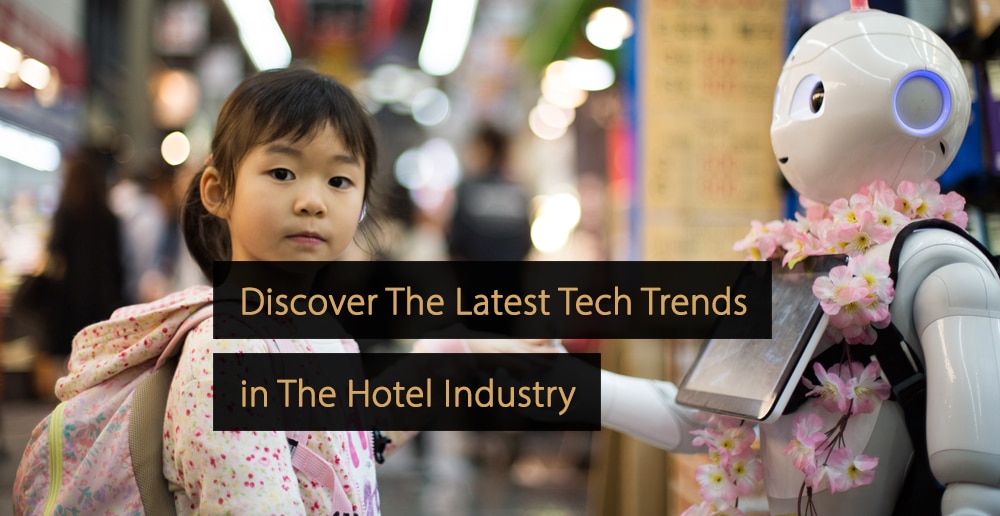Question for Our Hotel Marketing Expert Panel
How Are Current Tech Trends Impacting the Hotel Experience In 2023?
Industry Expert Panel
Our Industry Expert Panel exists out of professionals within the hospitality & travel Industry. They have comprehensive and detailed knowledge, experience in practice or management and are forward-thinking. They are answering questions about the state of the industry. They share their insights on topics like revenue management, marketing, operations, technology and discuss the latest trends.
Our Marketing Expert Panel
- Thom de Graaf – Digital Marketing Specialist at Orange Hotel Marketing
- Tamie Matthews – Revenue, Sales & Marketing Consultant, RevenYou
- Cory Falter – Partner and Visionary at Lure Agency
- Kaylie Holley – Hospitality and Tourism Marketing Professional
- Max Starkov – Adjunct Professor Hospitality Technology, New York University
- Matthias Dybing – Co-Founder & Director at Nuvho
- Thomas Dieben – Founder, Becurious
- Linda Bekoe – CEO at APLBC & CEO at Bekoe.com
- Jacopo Focaroli – CEO & Founder, The Host
- Nicole Sideris – Founder & Prinicipal Consultant, X Hospitality
- Dustin Caromano – Director of Marketing and eCommerce, Première Advisory Group
- Luminita Mardale – Director Of Marketing And Business Development, Vienna House
- Lisa Bouma – Sales & Hospitality at Lisa Bouma Sales Services
- Peter Ricci – Clinical Professor and Director of Hospitality & Tourism Management Program at Florida Atlantic University (FAU)
- Ask Our Panel a Question
- Join Our Expert Panel
“The popularity of Chat GPT, and other AI technology that will integrate into the platforms we use every day, will change guest expectations as well. You can now get structured, elaborate, answers to complex questions or automate mundane tasks in mere seconds.
This instant gratification will most likely have an effect on how guests perceive their experience along their journey. It’s all about a balance between implementing tech and the human connection: a check-in at a hotel shouldn’t be about filling in forms with data that a hotel already has (this should be automated), but about being a host for the guest.”
“The four key trends we’re watching, and actively working with clients on, are:
- The move to Google Analytics 4 and what it’ll mean for our small business owners.
- Sustainability – Talked about for far too long and it’s time to act. Our big concern though is that each OTA, TMC, and tourism association is creating its own criteria and implementing its own scorecards which are leaving small business owners confused as to which program to utilize and what will be universally recognized.
- Inclusivity – Marketing to all customers. Photography must start representing clients. We can no longer utilize only young, good-looking, Caucasian models. To fully engage with a diverse range of potential clients we must start showing people of all abilities, ages, and races.
- Technology – We need to stop saying “when covid is over our staff will come back”. Small business owners have to stop talking and start doing. Invest in the tech stack and use technology to fill labor shortages – because this won’t change anytime soon.
Another big change in marketing in 2023 will be around the use of AI. It has an amazing array of uses and, if used with care and caution, can implement great change. Small businesses can utilize AI to create social media posts, blogs, newsletters, descriptions for their room types and rate plans and so much more. But users must also ensure that the content being created is on brand, maintains its tone and voice, and is appropriate for their clientele. In short, make sure you don’t sound like a robot!
But remember that the person running the AI is responsible for sense-checking before making the content live. The business owner is also responsible for checking that the information they input into AI in the pursuit of generating new content is safe and that they’re not giving away trade secrets. AI is a shared platform at this stage, pulling from other websites. What are you happy to give away in pursuit of a quick and easy new social media post? We also need to move away from the concept that upgrading technology is only about creating a contactless check-in. We can create a better guest experience by adding items such as digital compendiums, in-room ordering that doesn’t require phoning room service and waiting on hold for 15 minutes and so much more.”
“Unlike the software industry, the hospitality industry is lagging behind in tech trends. And especially on the meetings and events side for sales and marketing. It’s still very much a reactionary environment for acquiring new prospects and nurturing existing customers. One which relies on other sources from businesses, like brokers and third parties. The industry has benefited from some great times for over a decade and the need to change hasn’t hit critical mass. But times are changing.
Remote work culture and the rise of the non-professional meeting planner industry leaders like Christi White are talking about right now. New prospects aren’t using platforms and RFPs. They’re using Google and they need a lot of help since many of them have little or no experience. That’s a HUGE shift and opportunity for proactive sales professionals. Focussing on direct business will help attract these new prospects and improve the guest experience by offering a highly-personalized journey from the first touch through testimonial requests.”
“Tech is allowing hotels to dial in so much closer to their customers and get in front of their target audience. The cast net is not so wide, and conversion is much higher. Also, the variety of options that impact marketing and experience is multiplying.”
“The pandemic accelerated digital transformation by 10 years (McKinsey & Company) and today’s travel consumers have become more digitally oriented and tech-savvy than ever. Today’s service expectations are centered around self-service, do-it-yourself, online planning and booking, contactless check-in, mobile keys, voice assistants, and communication with hotel staff via messaging. It’s time for our industry to give DIY-obsessed customers what they want! Accelerated Investments in technology – cloud, mobility, AI, robotics, IoT, and other next-gen technology applications and innovations are needed to “appease” these exceedingly tech-savvy guests and their exceedingly high technology expectations.
This drastically increased digital savviness among travelers determines how hoteliers should conduct their marketing. And it’s why today’s hotel marketing is 100% digital. It’s that simple: fish where fish are i.e. in the digital universe. Travel consumers spend 7 hours per day with digital media channels and only 19 minutes with print media like newspapers and magazines. Over 90% of travelers turn to the Internet when looking for a place to stay. More than all other sources of travel inspiration combined – including family, friends, travel guides, travel advisors, tour operators, etc.”
“I previously answered the marketing question. But the guest experience and staff shortages post-Covid are creating an opportunity to rethink the way we deliver hotel services and guest experiences. Tech can activate a lobby in a different way. Not everyone wants to speak to a staff member to check into their room. Airlines have shown the way and I think we are starting to embrace this in the hotel industry by enabling pre-stay checking and on-site key card tech via mobile. This allows people to check in and get to our room without having to talk to anyone.
Does it mean the service is reduced, no. It’s there when needed, but more efficient, and perhaps more cost-effective. I think personalization also comes into the mix. Pre-stay, curated communication tech needs to embrace the multi-dimensional nature of hotel distribution to enable hoteliers to communicate with guests regardless of the platforms they book on.
Our thinking is often direct vs. indirect. But guests are oblivious to the commissions hoteliers pay third parties. Pre-stay communication, contact information to match profiles, being able to personalize service, all require an omni-distribution communication platform. One which all OTAs, T/A, and hoteliers provide informational access to in order to provide guests with improved service. As opposed to battling for the right to communicate with a guest because one party thinks they “own” this particular consumer. No one owns consumers; they’re driven by value and recognition; they’ll switch booking channels in an instant for instant gratification and deals. The current status quo is detrimental to servicing consumers the way we should, by recognizing previous stays, etc…regardless of their current and past purchasing behavior.
You want to reward the guests, not the way they book, if that makes sense. I think that tech alone isn’t sufficient to improve the current guest experience and achieve true personalization. We need a holistic approach between hoteliers and third parties to share info within a framework designed around a guest’s benefit. Only then will we achieve true personalization.”
“Artificial Intelligence (AI) and Machine Learning (ML) have the potential to transform the hospitality industry. One example is the use of AI and ML to replace hotel personnel in guest communication. Automated messages can be sent to guests prior to their stay, providing them with relevant information and offering upsell opportunities to enhance their experience.
Revenue management systems can also use ML to make predictions and adjust pricing accordingly. IoT is another technology that’s being adopted by hotels. Smart room controls, such as lighting, temperature, curtains, music, and video can be controlled by IoT-enabled devices. IoT can also be used to track and manage hotel inventory, such as linens, waste, furniture, towels, and other assets. Virtual Reality (VR) is also being used in hotels for a variety of purposes.
Online meetings can be conducted using VR, and hotels can offer virtual tours to showcase their facilities and amenities. VR can also be used for entertainment purposes, such as offering guests VR gaming experiences. Oh, and don’t forget the hologram at the front desk that welcomes your guests!”
“The use of mobile apps in hotels is becoming increasingly popular as more properties offer tablets and apps that allow guests to easily communicate with staff. Hotels need to focus on the in-room technology experience and offerings, including use of smart TVs and how guests consume content. Guests should be able to log into their favorite on-demand apps and continue watching their previously viewed content. Given that most people have Alexa at home, hotels need to recognize the power of automation in hotel rooms. The guest experience is an area where many hotels could improve to meet customer expectations.”
“The most significant ones in my opinion include the increased use of artificial intelligence (AI) and machine learning (ML). It can personalize guest experiences and provide customized recommendations or promotions based on guest preferences. As we mentioned before, these two go along with a growing use of virtual and augmented reality, contactless technology, touchless payment options, smart room technology that lets guests control various aspects of their rooms, energy-efficient technology, water conservation, and waste reduction. All these solutions taken together can enhance guest satisfaction, increase revenue, and differentiate the hotel from competitors.”
“One growing issue can be seen as properties go partially or fully digital. In some instances, databases aren’t updated with guest information such as addresses. Without a true front desk we won’t know why a guest is staying or where they came from. Guests are expecting instant, touchless communication from their devices. Hotel tech needs to support international numbers and not rely on emails.”
“Hotel advertising campaigns should have a strong video focus, encourage guests to share their experience through post-stay surveys, prioritize mobile-friendly websites and branded apps that accommodate digital check-in, allow guests to make reservation changes, provide mobile access to digital services, and accommodate contactless event check-in. You might even enable uploading of a virtual tour to the hotel website.”
“You can create memorable experiences that keep guests coming back and drive success in today’s competitive hospitality landscape by striking a balance between technology and personalized service. For example, digital locks like Nuki, chatbots on the website to provide instant responses to frequently asked questions and assist with booking inquiries or WhatsApp services for guests like the company Localie. At the moment it’s even possible to digitalize the whole reception with a Hologram like the company holoconnects.”
“It seems like there’s something new designed to “improve” guest service every month. In all honesty, you need to survey your typical demographic within your typical hospitality asset. Some restaurants, cruise ships, hotels, casinos, et al. differ in terms of the trends most likely to IMPROVE their typical guest’s experience. Again, a “typical” guest is hard to define – yet, with surveying and interaction, we are more likely to hit the mark with the tech trends that will work for us.
Having a GEO type locator of nearby attractions might rank 1 out of 10 or 2 out of 10 (toward the bottom) if a hotel is close to a major theme park. Yet, our Dir. of Sales might “really want” that type of technology due to a presentation he or she has seen. Be logical. “Match the TECH to the GUEST.” I recently sailed on a cruise line that had technology desired for teens to 30 and the typical passenger was over 65 years old. A complete mismatch and potential waste of dollars.
Artificial Intelligence is impacting hotel marketing all around the world, except in Italy, where it’s been temporarily banned. Examples include daily or weekly content updates, press release writing, and so forth. Virtual Reality incorporation into booking systems is helpful and is creating more of “experience excitement booking” as I call it…especially where these details are important (cruise, rail excursion, tour package of a yet-unvisited area et al.).
Another trend discussed by my colleague yesterday is the “on the go” type of traveler. This is someone who has a very short booking window, as short as NOW. They’re asking what they can do within the next 1, 2, 3, days and at what price. Wynn Las Vegas just incorporated Alexa for Hospitality so that a guest can ask what’s going on around them and venues can market directly to these immediate-booking or short-booking guests. The speed of marketing continues to accelerate and the booking window by guests continues to shrink.”
Ask a Question & Join Our Expert Panel
Would you like a question to be answered by our Industry Expert Panel? Or would you like to join our community of experts and share your experience, insights, and knowledge with fellow industry professionals? Via the buttons below you can submit a question or submit a request to become part of our expert panel.
More Tips to Grow Your Business
Revfine.com is the leading knowledge platform for the hospitality and travel industry. Professionals use our insights, strategies, and actionable tips to get inspired, optimize revenue, innovate processes, and improve customer experience.Explore expert advice on management, marketing, revenue management, operations, software, and technology in our dedicated Hotel, Hospitality, and Travel & Tourism categories.




















Leave A Comment